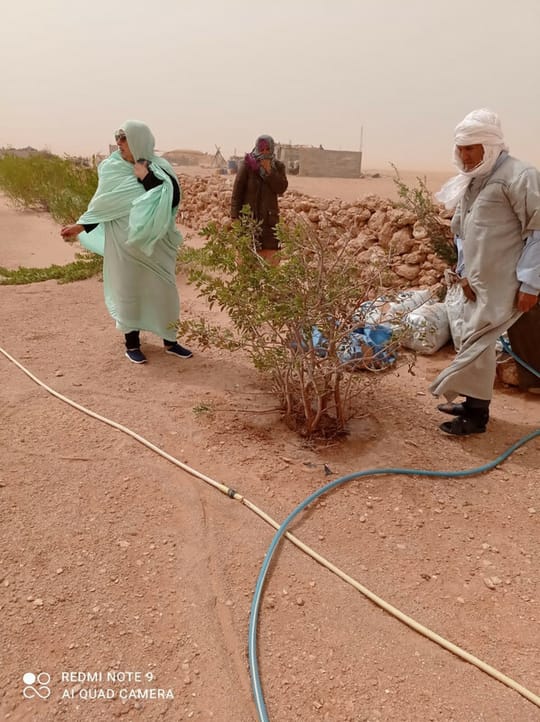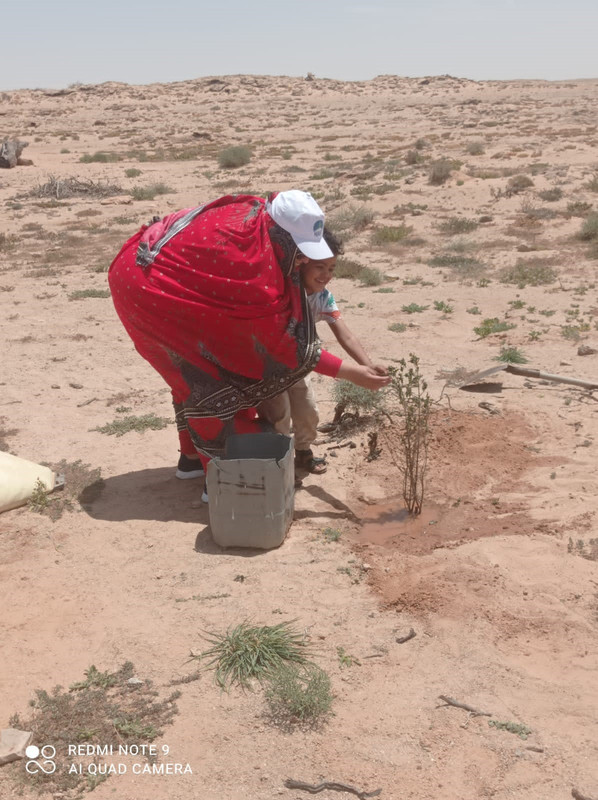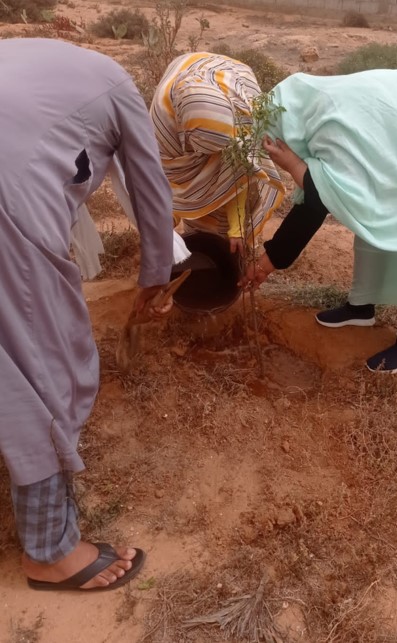Seeds of Change: Empowering Saharan Nomadic Farmers through Tree Planting

Recently, HAF embarked on a groundbreaking endeavor: planting trees with the Saharan nomadic community for the first time. During initial community forums between HAF and the Saharan nomads, there was significant interest in growing fruit trees despite the challenge of the desert climate.
While acknowledging the difficulty of climatic conditions, the community recognized the significant contribution of trees to a balanced ecosystem: providing shade, conserving water, and promoting a positive environmental impact within the region.
The local farmers accepted the challenge. Eager to begin planting, the nomadic farming community received a donation of 800 fig and pomegranate trees. The High Atlas Foundation team worked closely alongside these farmers during the process, providing resources and support to ensure the project’s success.
Despite the arid conditions, these farmers are displaying determination and resilience, driven by their passion for a greener future. They understand that the presence of trees will not only benefit their immediate surroundings but also have a lasting effect on the broader regional ecosystem.
The project has economic potential as well. The abundance of figs and pomegranates will provide the community with a valuable source of income, as they could sell the fruits locally or even explore regional and international markets. The economic stability associated with such markets will empower the community, allowing them to invest in other projects as desired.

The day was windy, but that didn’t hinder HAF and participants’ determination to plant trees.
Photo by Hana Ezaoui.
Cheikh Akmach
HAF Site Coordinator, Dakhla-Oued Ed-Dahab region

Tree planting in the desert. Credits: Volunteer
Recently, HAF embarked on a groundbreaking endeavor: planting trees with the Saharan nomadic community for the first time. During initial community forums between HAF and the Saharan nomads, there was significant interest in growing fruit trees despite the challenge of the desert climate.
While acknowledging the difficulty of climatic conditions, the community recognized the significant contribution of trees to a balanced ecosystem: providing shade, conserving water, and promoting a positive environmental impact within the region.
The local farmers accepted the challenge. Eager to begin planting, the nomadic farming community received a donation of 800 fig and pomegranate trees. The High Atlas Foundation team worked closely alongside these farmers during the process, providing resources and support to ensure the project’s success.
Despite the arid conditions, these farmers are displaying determination and resilience, driven by their passion for a greener future. They understand that the presence of trees will not only benefit their immediate surroundings but also have a lasting effect on the broader regional ecosystem.
The project has economic potential as well. The abundance of figs and pomegranates will provide the community with a valuable source of income, as they could sell the fruits locally or even explore regional and international markets. The economic stability associated with such markets will empower the community, allowing them to invest in other projects as desired.

The day was windy, but that didn’t hinder HAF and participants’ determination to plant trees.
Credits: Hana Ezaoui/HAF
As the fruit trees take root and flourish, they will become a source of pride and hope for the nomadic farmers. The transformation of the once barren landscape into a vibrant orchard will become a symbol of resilience and the triumph of human spirit over adversity.
HAF remains committed to its ongoing mission of promoting environmental stewardship and sustainable practices not only within the Saharan nomadic community but also in other regions facing similar challenges.
This collaborative project marks a significant milestone in the nomadic community. These farmers are choosing to adapt to the harsh conditions of the Sahara with sustainable solutions. By planting trees, these communities are moving toward sustainable food and income sources, fostering regional biodiversity, and mitigating the effects of desertification.
This groundbreaking initiative sets an encouraging precedent for future collaborations between HAF and other nomadic communities, emphasizing the organization’s commitment to promoting environmental stewardship and sustainable practices across regions.

Nomadic community members planting trees in the desert. Credits: Hana Ezaoui/HAF

Nomadic community members plant trees in the desert. Photo by Hana Ezaoui.